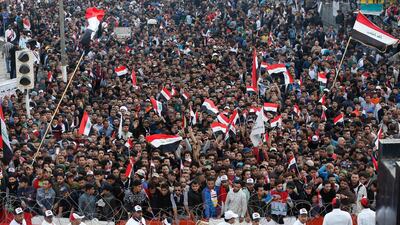About a year into its tenure, the Iraqi government of Prime Minister Adel Abdul Mehdi must have thought it was through the most dangerous summer period. Yet this month’s protests across the south and Baghdad, repressed with lethal force, show the economic model is failing, that a post-Saddam generation is impatient, and time is running out.
The Iraqi protests have their own dynamics. There are complaints about the sectarian-based political system’s corruption, the stranglehold of the supposedly competing parties, and excessive Iranian influence. Now, the brutality of the crackdown, with more than 110 people killed, adds to the grievances. The Turkish invasion of north-eastern Syria also threatens to push more refugees into Iraq, and possibly revive the danger from ISIS.
But the country’s economic malaise is repeated across almost the entire Middle East and North Africa. Like other regional peers, the government budget and balance of payments are excessively dependent on oil: 99 per cent of exports and 90 per cent of state revenues in Iraq. This compares to 95 and 75 per cent respectively in Algeria, 95 and 90 per cent in Kuwait.
Iraq’s oil output is at least growing strongly, unlike in most Mena countries. Yet oil prices are unlikely to rise much on a sustained basis, and global oil demand could peak in the 2030s.
Unlike its wealthy Gulf neighbours, Iraq does not have a sovereign wealth buffer; indeed, debt is about half of its economic output. Unlike the UAE and Saudi Arabia, it has not introduced a value-added tax. Most of the budget is swallowed up by the current expenditures for defence, salaries and subsidies; less than 20 per cent goes on investment, less than half that is in the non-oil sector, and only 65 per cent of that is actually spent.
Youth unemployment is high. Rapid population growth, adding more than a million Iraqis every year, will make this a challenge for decades to come. Government employment is excessive and unproductive, but still not enough to absorb new job-seekers, so access to secure and better-paid state jobs depends on party patronage and nepotism.
Outside the oil sector, most other jobs are informal, uncertain and poorly paid. Even when economic growth is strong, as in Egypt, the benefits do not trickle down to most people, who still bear the brunt of austerity measures. Real privatisation has been minimal, and state-owned firms crowd out genuine entrepreneurship and buy up the success stories.
Arguably the Mena region’s private sector, such as it is, is dominated by well-connected businesspeople who benefit from government contracting, real estate and imports rather than the competitive export-oriented businesses that drove east Asia’s economic miracle. A recent law requiring 51 per cent Iraqi ownership of companies is a backward step, deterring foreign investment.
In most Mena states, promoting exports outside the energy and mining sectors has been lacklustre. Energy-intensive materials such as aluminium, petrochemicals and steel are only a partial diversification. Various tourism hot-spots, the UAE’s re-export trade, and Morocco’s car industry, are rare exceptions. Intra-regional trade is low and faces bureaucratic and security barriers.
Iraq again fares even worse here: it has a small and ramshackle industrial sector and has not emulated its neighbours in turning oil and gas by-products into a competitive petrochemical industry. Only recently has it made progress in capturing the wastefully flared gas from its oil-fields to boost electricity generation. Despite a wealth of history, security fears and unreasonable visa procedures limit tourism outside pilgrimages.
One positive feature across the region is the reduction in wasteful energy subsidies. Yet Iraq lags behind even here: electricity prices for the lowest consumers are less than 1 cent (3.67 fils) per kilowatt hour, yet many bills go unpaid. Electricity service, long a cause of summer protests, has improved significantly this year, but still falls well short of demand.
Water supply has also improved after last year’s anger at polluted rivers in Basra, but is a looming longer-term threat as regional droughts worsen and Turkey fills the dams that source the Tigris and Euphrates. Neglected agriculture forces people from the land, providing support for insurgencies and swelling the urban underclass.
The government of Mr Abdel Mahdi has trotted out the usual responses: investigations, ministerial reshuffles, a crackdown on corruption, the allocation of more government jobs and hand-outs.
But these will only exacerbate the long-term problems. Real solutions would mean cutting state jobs, simplifying laws and bureaucracy, reducing subsidies, restructuring and selling off decrepit state firms, opening up to foreign investment, denying parties their sources of patronage, and raising taxes and fees.
These ideas, and others on reforming politics and society, appeared in the December 2017 manifesto released by Luay Al Khatteeb, now electricity minister, Abbas Kadhim of the Atlantic Council, and former finance and defence minister Ali Allawi. The cabinet actually contains several capable technocratic ministers, but it is almost impossible for them to implement deep reform, because of party pressure and the patronage schemes that extend deep into their ministries.
And such transformation would be painful in the short term, and likely bitterly opposed both by the incumbent political machine, and by the same people now protesting. The benefits, in long-term fiscal stability, reliable water and electricity, better public services, a vibrant private sector and less zero-sum politics, would take time to appear.
Iraq has to confront the changing energy world. A new vision is needed. Its advocates have to gain power, persuade an angry population to patience, then walk the tightrope of radical reform.
Robin Mills is chief executive of Qamar Energy, and author of The Myth of the Oil Crisis


